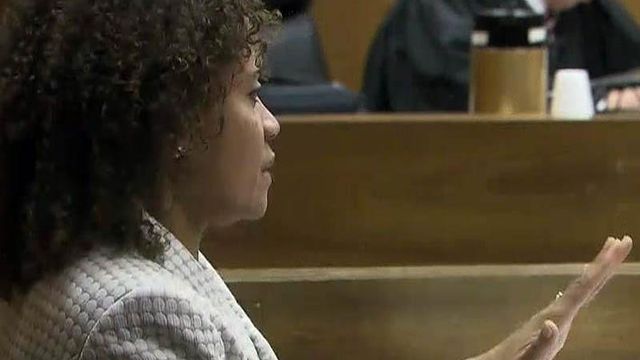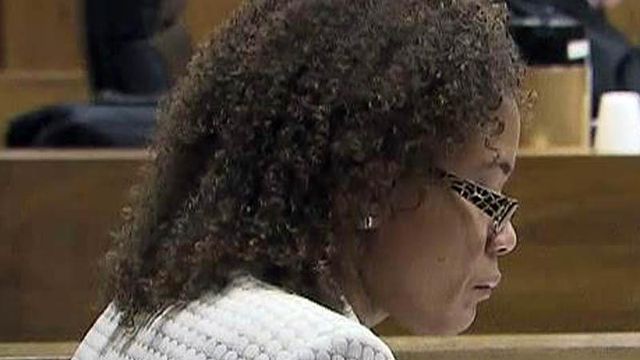Durham DA defends her attacks on judge
Embattled Durham County District Attorney Tracey Cline said Friday that she should have chosen her words more carefully but defended accusations of corruption she has made against a Superior Court judge in recent months.
Posted — UpdatedCline took the stand to testify in her defense during a rare judicial inquiry to determine if she should be removed from the office she has held for three years.
She has repeatedly accused Judge Orlando Hudson of bias against her and has asked to have him barred from handling criminal cases in Durham County. Two other Superior Court judges have found Cline's complaints to be groundless.
"What I recorded in those motions is absolutely true. How I said it could have been better," she said.
The attacks prompted attorney Kerry Sutton to file an affidavit last month that alleges Cline has "brought the office of the Durham County District Attorney and the entire Durham County justice system into disrepute."
Superior Court Judge Robert Hobgood suspended Cline with pay last month, pending a full hearing, saying there was probable cause to support Sutton's claims.
Sutton presented evidence on Monday from lawyers who said that Cline's attacks on Hudson have undermined public perception of the court system. She will get a chance to cross-examine Cline on Monday morning.
Cline said Friday that she felt she had no choice but to challenge what she viewed as questionable rulings made by Hudson, even if it meant political suicide.
"I knew it was going to be rough – I didn't think it would be this rough – but it was something I had to do," she said. "It was an extremely difficult decision because I still care for Judge Hudson."
She said she has always considered Hudson to be somewhat of a mentor since she first met him in the late 1980s while working as a public defender.
"I always looked up to Judge Hudson. I felt like his application of the law was fair," she said. "I felt like he was a role model for me as a then-young African-American coming forth to practice law.”
Differences began in 2010
In late 2010, Cline testified, Hudson tried to persuade her to sign a consent order stating that jury selection in North Carolina was racially biased. The order would have been part of an appeal made under the state's Racial Justice Act, which allows death row inmates to use statistical evidence to show bias in their cases and challenge their sentences.
Cline said she refused to sign the order, saying she had questions about how the races of some members of jury pools were classified.
Around that same time, she said, Hudson urged her to dismiss a case against Derrick Michael Allen, who was appealing his 1998 murder and sexual assault conviction involving a 2-year-old girl who had died of shaken-baby syndrome.
Allen's appeal was based on problems with the way the State Bureau of Investigation crime lab handled blood evidence, and Cline said Hudson told her she didn't need to be defending the SBI.
"This case needs to go away, and you need to dismiss it," she quoted Hudson as saying.
She refused to dismiss the case, saying there was enough medical evidence to support Allen's conviction without presenting any SBI blood evidence. Her decision angered Hudson, she said, and he proceeded to dismiss the case.
His written order in the case suggested that Cline, another prosecutor and an SBI analyst withheld evidence from Allen's attorney. Cline denied withholding any evidence in the case.
"I know in my heart what I had done and what I had not done," she said.
When Hudson dismissed a murder charge against Michael Dorman last August, he stated in his order that Cline had worked with Durham police, state medical examiners and others to cremate the remains of the victim, thereby destroying critical evidence in the case.
Dorman had been arrested in 2010 with a woman's bones in his backpack. After determining the cause of death in the case, medical examiners released the remains to the victim's family.
”There was never a meeting or a gathering of anybody to try and destroy evidence,” Cline testified, adding that no evidence of any conspiracy was ever presented during a three-day court hearing.
Dr. Jonathan Privette, associate medical examiner in the state Office of the Chief Medical Examiner in Chapel Hill, testified that he was merely following state law in releasing the remains. He denied working with law enforcement authorities to ensure the remains were cremated.
Hudson showed 'clear animosity'
Cline said she tried to talk to Hudson several times about his decisions and negative news articles published about her but said he began to show "clear animosity toward me." Her staff also said that he was shifting the criminal docket around so much that it was difficult to try cases, she said.
At that point, she said, she filed a complaint with the state Judicial Standards Commission. She said, however, that she felt she needed a more immediate response, so she reluctantly began filing motions seeking to have him barred from hearing cases.
"I thought about my obligations as district attorney," she said. "I cannot tell my staff to seek justice, and I'm afraid (to do so)."
Proceedings to remove an elected district attorney are rare in North Carolina, having been held only once before in the 1990s.
Defense Attorney James Van Camp tried earlier Friday to get the case dismissed. He argued that the state law that allowed the judicial inquiry was too vague and that it violates Cline's rights to free speech and due process.
Referring to former U.S. Supreme Court Justice Potter Stewart's "I know it when I see it" attempt to define obscenity, Van Camp said the statute at play in Cline's case doesn't provide enough guidance for him to put up a defense or for the judge in weighing the facts of the case.
"I'm sorry, but that is not the proper standard," he said. "That is not a standard to enable the advocates of either side to determine what must be proven."
Hobgood denied the motions, saying he had set guidelines for the evidence to be considered and that he doesn't consider the statute "unconstitutionally vague."
• Credits
Copyright 2024 by WRAL.com and the Associated Press. All rights reserved. This material may not be published, broadcast, rewritten or redistributed.






